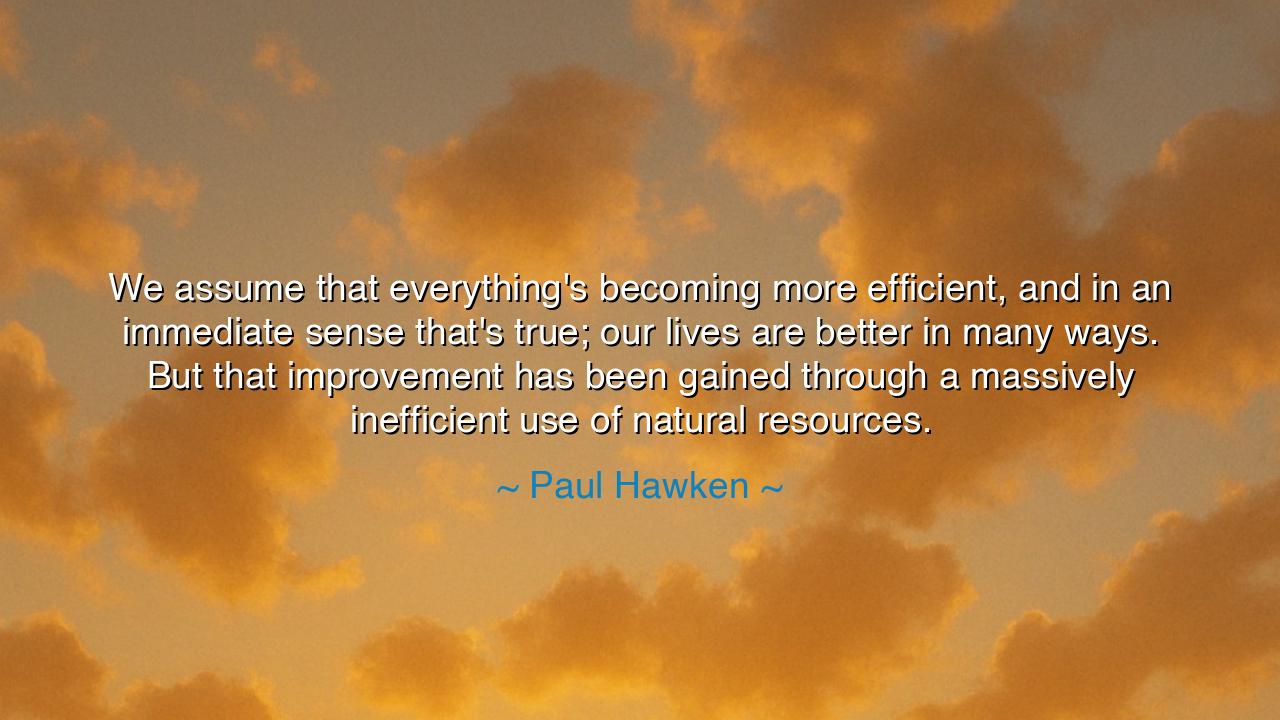
We assume that everything's becoming more efficient, and in an
We assume that everything's becoming more efficient, and in an immediate sense that's true; our lives are better in many ways. But that improvement has been gained through a massively inefficient use of natural resources.






“We assume that everything’s becoming more efficient, and in an immediate sense that’s true; our lives are better in many ways. But that improvement has been gained through a massively inefficient use of natural resources.” So spoke Paul Hawken, a seer of the modern age, whose voice rises like a conscience among the machines. His words pierce through the glittering illusion of progress and remind us that what we call efficiency may be but a mirage—one that shines brightly in the present, while draining the lifeblood of the Earth that sustains us. For though our hands have built wonders and our minds have harnessed fire, light, and motion, the question remains: at what cost has this improvement been bought?
Since the dawn of civilization, humankind has striven to conquer limitation—to make life easier, faster, more abundant. The ancients carved canals, built looms, and forged iron; the moderns have tamed lightning, split atoms, and sent their voices across the heavens. Each step has indeed brought greater comfort and convenience. But in their hunger for mastery, men have forgotten the balance that binds all things. They have extracted from the soil without gratitude, burned forests without remorse, and drawn from the deep wells of oil as though from an endless cup. Hawken’s wisdom reminds us that this illusion of efficiency is paid for with the slow exhaustion of the planet itself.
Consider the tale of Easter Island, that distant land once rich with palms, birds, and fertile ground. Its people, ingenious and industrious, built towering statues to honor their gods, believing their labor a mark of greatness. But in their fervor, they felled every tree for their tools and their transport. When the last tree fell, their society fell with it. Their efficiency in crafting monuments was matched only by their inefficiency in preserving life. They had improved their art, but destroyed their home. And so their island became a graveyard of wisdom forgotten—a warning to all who believe that progress without restraint is salvation.
We, the heirs of the modern age, walk upon a grander Easter Island. Our machines hum, our cities blaze, and our lives seem wondrously improved. Yet beneath the pavement, the soil grows weary. The oceans, once boundless, choke with our waste. The air thickens with invisible scars. Each gadget that saves us time consumes the natural resources of centuries; each comfort we take for granted costs forests, rivers, and creatures beyond counting. Hawken’s words are not condemnation, but a plea for awakening: that we may look beyond the short term, and see that our inefficiency lies not in our tools, but in our blindness.
The ancients taught that wisdom is the harmony of opposites—the balance between action and restraint, between desire and gratitude. We must learn again that efficiency without reverence is ruin in disguise. A plow that strips the land bare may feed us for a season but starves generations to come. A factory that produces abundance while poisoning the river is no triumph, but tragedy masquerading as success. True efficiency honors the circle of life; it gives back what it takes, and leaves the Earth no poorer than it found her.
We see this truth shining in the efforts of those who have listened to Hawken’s call—the farmers who restore soil through regeneration, the inventors who draw power from the wind and sun, the builders who raise cities that breathe instead of choke. These are the new stewards of the Earth, who understand that technology and nature need not be enemies, but partners in the dance of renewal. Like the great forests that thrive through diversity and balance, a civilization, too, must root itself in respect if it is to endure.
So, O listener, let this teaching settle into your heart: Do not mistake improvement for wisdom, nor convenience for progress. Ask of every action—does it heal or harm? Does it give life, or does it consume without end? Let your hands build, but let your spirit remember. Choose to live with reverence for natural resources, to walk lightly upon the Earth, and to give back where you have taken. For in this gentler path lies the truest efficiency—the art of living well without leaving ruin behind.
And when the next marvel of human invention dazzles your eyes, recall the voice of Paul Hawken, calm and enduring as an echo through time: “Our lives are better, yes—but at the cost of the world that makes life possible.” Let that truth not bring despair, but awakening. For though we have been wasteful, we are not beyond redemption. The Earth still breathes, and while she breathes, there is hope—if we learn again not only to create, but to cherish.






AAdministratorAdministrator
Welcome, honored guests. Please leave a comment, we will respond soon